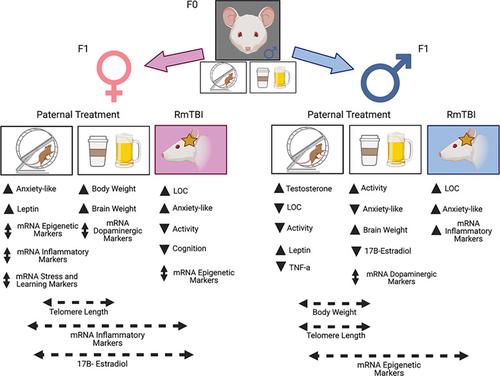当前位置:
X-MOL 学术
›
Genes Brain Behav.
›
论文详情
Our official English website, www.x-mol.net, welcomes your
feedback! (Note: you will need to create a separate account there.)
Paternal exposure to exercise and/or caffeine and alcohol modify offspring behavioral and pathophysiological recovery from repetitive mild traumatic brain injury in adolescence
Genes, Brain and Behavior ( IF 2.4 ) Pub Date : 2021-04-19 , DOI: 10.1111/gbb.12736 Eric Eyolfson 1, 2 , Dhyey Bhatt 2, 3 , Melinda Wang 2 , Alexander W Lohman 2, 3 , Richelle Mychasiuk 1, 2, 4
Genes, Brain and Behavior ( IF 2.4 ) Pub Date : 2021-04-19 , DOI: 10.1111/gbb.12736 Eric Eyolfson 1, 2 , Dhyey Bhatt 2, 3 , Melinda Wang 2 , Alexander W Lohman 2, 3 , Richelle Mychasiuk 1, 2, 4
Affiliation

|
Only recently has the scope of parental research expanded to include the paternal sphere with epidemiological studies implicating stress, nutrition and alcohol consumption in the neurobiological and behavioral characteristics of offspring. This study was designed to determine if paternal exposure to caffeine, alcohol and exercise prior to conception would improve or exacerbate offspring recovery from adolescent repetitive mild traumatic brain injury (RmTBI). Sires received 7 weeks of standard drinking water, or caffeine and ethanol and were housed in regular cages or cages with running wheels, prior to being mated to control females. At postnatal day 40, offspring were administered RmTBI or sham injuries and were assessed for post concussive symptomology. Post-mortem quantitative real-time polymerase chain reaction (qRT-PCR) was used to assess gene expression in the prefrontal cortex (PFC), nucleus accumbens (NAc) and changes in telomere length. Additionally, enzyme-linked immunosorbent assay (ELISA's) were run on serum to detect levels of cytokines, chemokines and sex hormones. Paternal experience did not improve or exacerbate RmTBI behavioral outcomes. However, female and male offspring displayed unique responses to RmTBI and paternal experience, resulting in changes in physical, behavioral and molecular outcomes. Injury and paternal exercise modified changes in female offspring, whereas male offspring were affected by paternal exercise, caffeine and alcohol treatment. Additionally, paternal experience and RmTBI modified expression of many genes in the PFC, NAc, telomere length and levels of sex hormones. Although further exploration is required to understand the heterogeneity that exists in disease risk and resiliency, this study provides corroborating evidence that paternal experiences prior to conception influences offspring development.
中文翻译:

父亲接触运动和/或咖啡因和酒精会改变后代在青春期重复性轻度创伤性脑损伤中的行为和病理生理恢复
直到最近,父母研究的范围才扩大到包括父亲领域,流行病学研究表明压力、营养和饮酒对后代的神经生物学和行为特征的影响。本研究旨在确定父亲在受孕前接触咖啡因、酒精和锻炼是否会改善或加剧后代从青少年重复性轻度创伤性脑损伤 (RmTBI) 中的恢复。在与控制雌性交配之前,公牛接受了 7 周的标准饮用水、或咖啡因和乙醇,并被安置在普通笼子或带跑轮的笼子中。出生后第 40 天,对后代进行 RmTBI 或假损伤,并评估脑震荡后症状。死后定量实时聚合酶链反应(qRT-PCR)用于评估前额皮质(PFC)、伏隔核(NAc)的基因表达和端粒长度的变化。此外,还对血清进行酶联免疫吸附测定(ELISA)来检测细胞因子、趋化因子和性激素的水平。父亲的经历并没有改善或加剧 RmTBI 行为结果。然而,女性和男性后代对 RmTBI 和父亲的经历表现出独特的反应,导致身体、行为和分子结果的变化。受伤和父亲的运动改变了雌性后代的变化,而雄性后代则受到父亲的运动、咖啡因和酒精治疗的影响。此外,父亲的经验和 RmTBI 改变了 PFC、NAc、端粒长度和性激素水平中许多基因的表达。 尽管需要进一步探索来了解疾病风险和恢复力中存在的异质性,但这项研究提供了确凿的证据,证明受孕前父亲的经历会影响后代的发育。
更新日期:2021-04-19
中文翻译:

父亲接触运动和/或咖啡因和酒精会改变后代在青春期重复性轻度创伤性脑损伤中的行为和病理生理恢复
直到最近,父母研究的范围才扩大到包括父亲领域,流行病学研究表明压力、营养和饮酒对后代的神经生物学和行为特征的影响。本研究旨在确定父亲在受孕前接触咖啡因、酒精和锻炼是否会改善或加剧后代从青少年重复性轻度创伤性脑损伤 (RmTBI) 中的恢复。在与控制雌性交配之前,公牛接受了 7 周的标准饮用水、或咖啡因和乙醇,并被安置在普通笼子或带跑轮的笼子中。出生后第 40 天,对后代进行 RmTBI 或假损伤,并评估脑震荡后症状。死后定量实时聚合酶链反应(qRT-PCR)用于评估前额皮质(PFC)、伏隔核(NAc)的基因表达和端粒长度的变化。此外,还对血清进行酶联免疫吸附测定(ELISA)来检测细胞因子、趋化因子和性激素的水平。父亲的经历并没有改善或加剧 RmTBI 行为结果。然而,女性和男性后代对 RmTBI 和父亲的经历表现出独特的反应,导致身体、行为和分子结果的变化。受伤和父亲的运动改变了雌性后代的变化,而雄性后代则受到父亲的运动、咖啡因和酒精治疗的影响。此外,父亲的经验和 RmTBI 改变了 PFC、NAc、端粒长度和性激素水平中许多基因的表达。 尽管需要进一步探索来了解疾病风险和恢复力中存在的异质性,但这项研究提供了确凿的证据,证明受孕前父亲的经历会影响后代的发育。











































 京公网安备 11010802027423号
京公网安备 11010802027423号